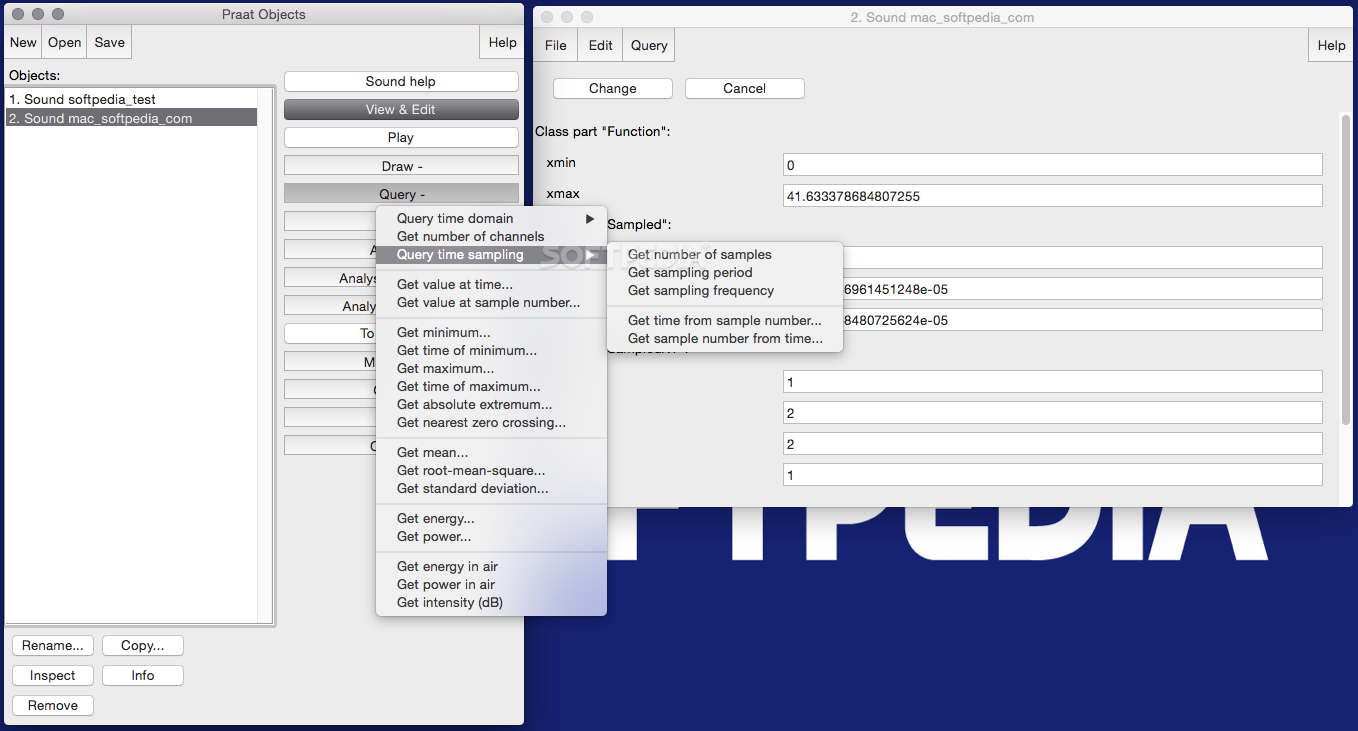The paper deals with the user's emotional state classification based on the voice track analysis, it describes its own solution - the measurement and the selection process of appropriate voice. Acoustic analysis General analysis Graphical interfaces. Praat; EMU; Audacity; WaveSurfer; Software packages. A Cooperative Voice Analysis Repository for Speech Technologies; VoiceBox; Formants Graphical interfaces. FAVE-extract; Pitch Graphical interfaces VoiceSauce. Command line tools REAPER. Google REAPER repository. Praat textgrids. VoiceSauce runs on directories of audio files in WAV format. If Praat textgrids are available, VoiceSauce can use those to limit analysis to labeled intervals on any tier. VoiceSauce can also use Praat textgrids to structure its output files. Thus almost always our first step, before. Praat Praat is a tool designed for speech analysis. It was developed at the University of Amsterdam by Paul Boersma and David Weenink. According to them, Praat is a tool for doing phonetics by computers. Figure 7: Creating TextGrid Figure 8: Annotating sound. Downloading and installing Praat There are multiple ways of getting Praat.
| Developer(s) | Paul Boersma and David Weenink |
|---|---|
| Initial release | 1991[1] |
| Stable release | |
| Repository | |
| Written in | C, C++, Objective-C |
| Operating system | Windows, Linux, Macintosh, FreeBSD, Solaris |
| Available in | English |
| Type | Free software |
| License | GPLv2[3] |
| Website | www.praat.org |
Praat Software For Voice Analysis

Praat (/prɑːt/; Dutch: [praːt](listen), 'talk') is a freecomputer software package for speech analysis in phonetics.[4] It was designed, and continues to be developed, by Paul Boersma and David Weenink of the University of Amsterdam. It can run on a wide range of operating systems, including various versions of Unix, Linux, Mac and Microsoft Windows (2000, XP, Vista, 7, 8, 10). The program supports speech synthesis, including articulatory synthesis.
Version history[edit]
| Version | Date | Main |
|---|---|---|
| 3.1 | 5 December 1995 | |
| 4.0 | 15 October 2001 | |
| 4.1 | 5 June 2003 | Mac OS X edition, More than 99 percent of the source code distributed under the General Public Licence. |
| 5.0 | 10 December 2007 | |
| 5.1 | 31 January 2009 | |
| 5.2 | 29 October 2010 | |
| 5.3 | 15 October 2011 | |
| 5.4 | 4 October 2014 | |
| 6.0 | 28 October 2015 | |
| 6.1 | 13 July 2019 |
References[edit]
- ^Boersma, Paul; van Heuven, Vincent (2001). 'Speak and unSpeak with Praat'(PDF). Glot International. 5 (9/10): 341–347.
- ^'Release 6.1.41'. 28 March 2021. Retrieved 16 April 2021.
- ^'License'. Phonetic Sciences | Praat. Retrieved 3 September 2019.CS1 maint: discouraged parameter (link)
- ^'Praat: doing phonetics by computer'. Retrieved 20 September 2017.CS1 maint: discouraged parameter (link)
External links[edit]
- Praat: doing Phonetics by Computer — Official site
Praat is an effective and free tool for speech analysis, speech synthesis and manipulation. It can be used widely for phonetics and linguistic research.
Authors:
Paul Boersma & David Weenink (2009)
University of Amsterdam
Praat: doing phonetics by computer (Version 5.1.05) http://www.praat.org/
Praat is currently the most accepted, popular and free software package for speech analysis. It is particularly helpful in phonetics classes and academic sessions for making spectrogram, pitch tracks and similar functions. Whatever be the level of knowledge about speech analysis and phonetics, this tool can be easily used to achieve desired results.
This tool can be used on diverse operating systems and is available for free download from the respective website. The tool offers extensive range of functions including articulatory analysis, spectrograph analysis and use of neural networks.
The major functions are:
Speech analysis:
- spectral analysis
- pitch analysis
- Analysis of formant
- intensity analysis
- Voice breaks, shimmer and jitter
- Excitation (pattern)
Speech synthesis:
- Synthesis of speech from formant, pitch and intensity
- Articulatory synthesis
- Klatt acoustic synthesis
Statistics:
- Analysis of principal component
- Multidimensional scaling
- Discriminant analysis
You can easily learn Praat with the help of user manual which describes all the functions in detail. If you are a beginner, you may find it difficult to use the tool. But it can be understood very easily and can achieve better results with the help of this all-purpose tool.
Intensity, Waveform, Spectrograph and Pitch analysis using Praat:
You can visualize and extract necessary information from a sound object using the Praat tool. You can use the “edit” function for this purpose.
Downloading Praat For Windows
- First you need to create a new speech object.
- Now, select the created object and choose the “edit” option from the main menu. You will get a new window.
- If the created sound object just occupies of a few part of the window, select the required part and extract this part to the sound object list.
- You can close the window now and then select the newly extracted sound object. Edit this again.
- The top menu comes with several options including File, Edit, Query, View, Select, Spec, Pit, Int etc.
Praat Software For Voice Analysis Free Download
For a/an/ sound, the default window view is:
Praat Software For Voice Analysis Services

Praat Demo Framework:
Free Voice Analysis Software
You may download and install Praat tool to learn more about this. This tool would definitely help you to perform better in areas of phonetics and speech research.




